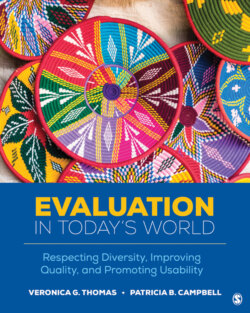Читать книгу Evaluation in Today’s World - Veronica G. Thomas - Страница 157
На сайте Литреса книга снята с продажи.
Yvonna S. Lincoln
ОглавлениеYvonna S. Lincoln, the first female president of the AEA, is probably best known in social science research, more generally, and evaluation, in particular, for her contribution to qualitative methodology. Lincoln, often in collaboration with her husband, Egon Guba, championed a constructivist, qualitative approach to understanding human phenomena. Their publications, Naturalistic Inquiry (Guba & Lincoln, 1985) and Fourth Generation Evaluation (Guba & Lincoln, 1989), especially the latter book, were written, in part, to address what they believe to be the inadequacies of previous evaluation methodologies. In Fourth Generation Evaluation, the authors point out that it was their intention to define an emergent, but mature, approach to evaluation that goes beyond mere science, or just getting the facts, to include the myriad human, political, social, cultural, and contextual elements involved (Guba & Lincoln, 1989, p. 8).
A major contribution that Lincoln made to the evaluation field during the 1980s and 1990s was to highlight the limitation of the field in its focus primarily on methods (i.e., how we come to know something) and rigor (i.e., how much trust we have in what we know). In her 1990 AEA presidential address, Lincoln (1991) focused on aspects of science that the profession had failed to notice, including the science of locating interested stakeholders; the science of getting information—good, usable information—to those same stakeholders; the science of teaching various stakeholder groups how to use information to empower themselves so they can participate more fully in democratic life and in decision making; and the science of communicating results. She moved the field beyond thinking only of the “sciences of evaluation” (i.e., methods and rigor) to also thinking more seriously about the “arts of evaluation” (summarized in Lincoln, 1991, pp. 4–6). Aspects of the arts of evaluation that Lincoln focused on in much of her work, and something she urged the evaluation community to consider, include
judgment—for evaluators to be able not only to render their own judgments in such a way that they can back them up, but also to elicit the judgments of stakeholders such that both evaluators and stakeholders are clear about the values, belief systems, and community mores undergirding those judgments;
appreciation—cultivating the art of appreciating in both evaluators and stakeholders and comprehending meaning within context, understanding the social and cultural milieu from which a program draws its particular expression, and seeing something fully and in its wholeness;
cultural analysis—paying attention to rituals, symbols, and meanings that coalesce when groups of people are engaged in a common pursuit;
“hearing secret harmonies”—or learning to listen for the meanings and not just searching for the one-to-one correspondence between objectives and their achievement; and
dealing with people very different from ourselves—for evaluators to get out on the front lines more, to rely on stakeholders who want to speak for themselves, to give voice to those who cannot be heard, and to see those who have been invisible.
Lincoln is the author or coauthor of more than 100 chapters and journal articles on aspects of higher education or qualitative research methods and methodologies. Her contributions to the field of evaluation continue and have provided insight for some more contemporary approaches such as transformative evaluation (see Chapter 5) and culturally responsive evaluation.
